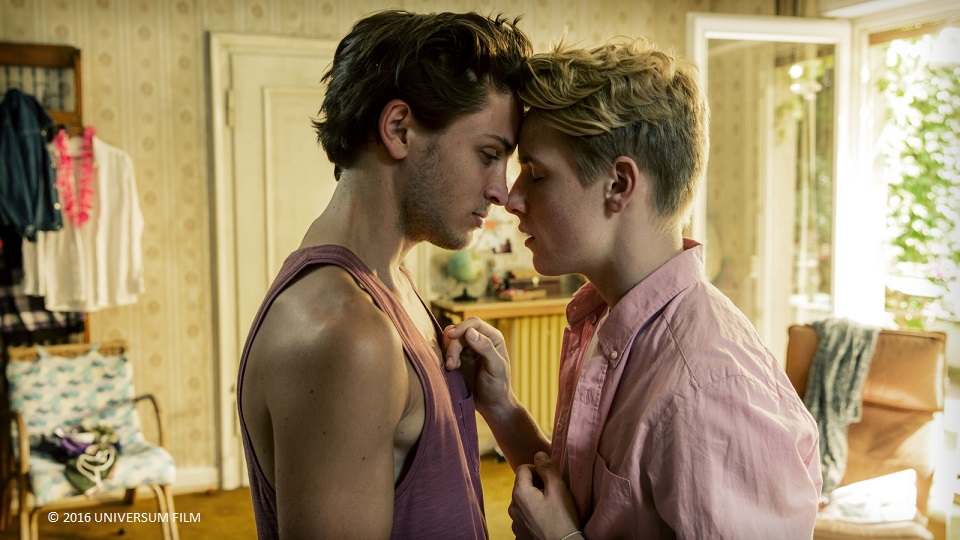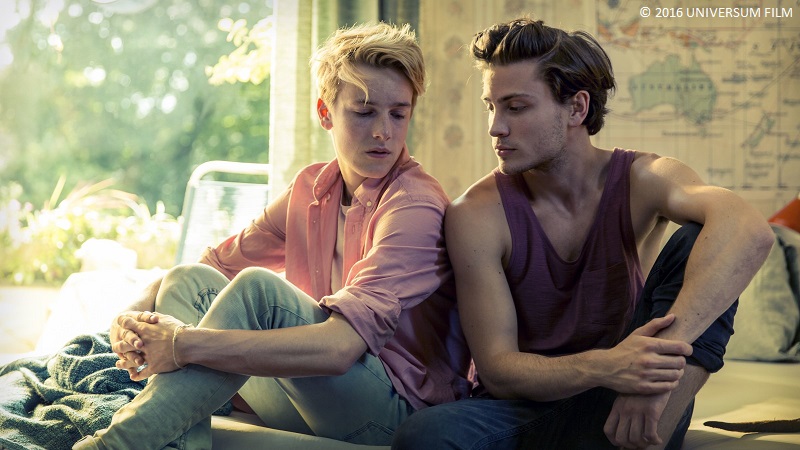It has taken over ten years, but now Andreas Steinhöfel's bestselling novel has actually been made into a film.
There are books that should never be made into films. That is, when too many readers have grown fond of them. Because no matter how hard a director tries, he will fail. Andreas Steinhöfel's "The Centre of the World" is another such novel. First published in 1998 and translated into half a dozen languages, it has accompanied hundreds of thousands of mainly young and (especially gay) readers into adulthood. Fans' fears that the film adaptation could only fail are well-founded. The story of 17-year-old Phil and his not-so-ordinary family is so full, poetic and yet true to life, so touching and haunting, that it can never be translated into a 90-minute film. Several filmmakers have tried - and given up. Jakob M. Erwa ("Homesick"), however, has now pulled it off, has cut some plot lines, deleted secondary characters and generally sought his very own approach to this young adult novel.
And not to keep the fans in suspense any longer: they can breathe a sigh of relief and be happy, says Andreas Steinhöfel. "The film has turned out fantastic. You hear me? ABSOLUTELY FANTASTIC! I'm happy and thrilled and very, very pleased," the bestselling gay author exulted on his blog after the first screening of the film. "'The Middle of the World' has everything in it that is important to me and that fans of the novel will expect."
Lush, sun-drenched, almost too beautiful cinema images

The film focuses on Phil's summer of his first great love. Filmmaker Erwa places it at the centre and tells it in lush, sun-drenched, sometimes almost too beautiful cinematic images.
Nicholaus makes an appearance. The new classmate (played by Jannik Schümann) doesn't just enter the classroom on his first day at school. No, Erwa literally lets him float in. Phil (Louis Hofmann) experiences this first encounter with the - still - unknown like an epiphany and in slow motion. Erwa repeatedly plays with such ironically used kitsch moments and still manages to visualise Phil's subjective emotional world. (Sometimes a bit too much and bold, to be honest.) Phil is head over heels in love with the cool sportsman and from then on he watches him train like a groupie. However, Nicholaus surprisingly makes the first move and suddenly everything seems perfect. Almost, at least.
A completely normal country bumpkin
This love story seems almost fairytale-like over long stretches. This is not only due to the fact that the remote, enchanted villa in which Phil lives with his twin sister and his somewhat eccentric mother Glass (Sabine Timoteo) creates a corresponding atmosphere. The storm of emotions that suddenly swirls around Phil remains anything but hidden. Why should it, there's nothing to hide. "I'm just a normal country bumpkin. Maybe a bit gayer than others, but otherwise a normal guy," Phil introduces himself off-screen at the beginning of the film. Phil likes boys, and that's not a problem for anyone. Not for Phil's penetratingly individualistic and unconventional drop-out mum anyway, nor for Phil's recently introverted and depressed twin sister Dianne (Ada Philine Stapenbeck) and Phil's best friend Kat (Svenja Jung). But even at school - not an issue.
In other words, a gay youth without any coming-out problems, without fear of stupid remarks and ostracism. In Steinhöfel's novel and now also in Erwa's film adaptation, this utopia is simply a reality (and, incidentally, the depiction of intimate affection and sexual togetherness is just as natural). Phil is simply gay, but otherwise a teenager with his very own problems. For example, the fact that his mother won't tell him who his father actually is. And that Kat is suddenly behaving so strangely and Nicholaus seems to be hiding something from him.
Euphoria and disappointment
Many a director who makes a film with gay characters likes to emphasise in interviews that of course he didn't make a gay film, but that his work deals with universal, human themes. As a rule, this is not only fearful and dishonest, but also a betrayal of his own film. With "The Centre of the World", however, such an argument would actually fit for the first time. "The Middle of the World" is a classic coming-of-age film about the euphoria and disappointments of first love, about the clash of emotions, about child-parent conflicts and about betrayal in friendship. In short: a film about growing up. With the only small peculiarity that a gay boy happens to be at the centre of it.
The fact that he, like his heartbreaker Nicholaus, is good-looking and can also look wonderfully romantic should also appeal to female viewers. And how will the straight guys react?
"The centre of the world". D/A 2016. Director: Jakob M. Erwa. With Louis Hofmann, Sabine Timoteo, Jannik Schümann, Ada Philine Stappenbeck. 115 min.; cinema release: 10 November 2016 - Goes to the film trailer










